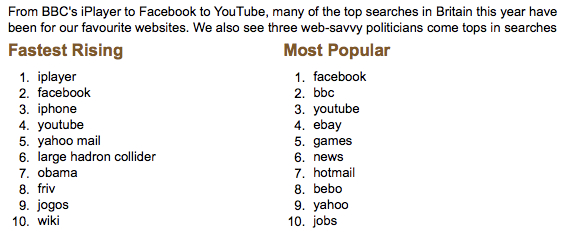Hmmm… From Google Zeitgeist. You can see why ISPs are getting jumpy about the BBC iPlayer.
Daily Archives: January 1, 2009
So what is ‘appropriate’?
Thoughtful post by David Robinson on Freedom to Tinker.
A couple of weeks ago, Julian Sanchez at Ars Technica, Ben Smith at Politico and others noted a disturbing pattern on the incoming Obama administration's Change.gov website: polite but pointed user-submitted questions about the Blagojevich scandal and other potentially uncomfortable topics were being flagged as "inappropriate" by other visitors to the site.
In less than a week, more than a million votes-for-particular-questions were cast. The transition team closed submissions and posted answers to the five most popular questions. The usefulness and interest of these answers was sharply limited: They reiterated some of the key talking points and platform language of Obama's campaign without providing any new information. The transition site is now hosting a second round of this process.
It shouldn't surprise us that there are, among the Presdient-elect's many supporters, some who would rather protect their man from inconvenient questions. And for all the enthusiastic talk about wide-open debate, a crowdsourced system that lets anyone flag an item as inappropriate can give these few a perverse kind of veto over the discussion.
If the site's operators recognize this kind of deliberative narrowing as a problem, there are ways to deal with it…
There’s an interesting parallel here between the mindset of Obama supporters and that of ANC supporters when Mandela came to power in South Africa. I knew several South African journalists who had been passionate opponents of apartheid and who found it very difficult to report frankly on the deficiencies of the new black government run by people who they had hither admired and supported.
Lessig’s move
From Jonathan Zittrain, relaying a message from Larry Lessig’s blog, which was down (maybe still is).
With the help of Joe Trippi, I launched Change Congress, which was designed to focus these issues in the context of American politics.
Throughout this process, however, I have felt that the work would require something more. That the project I had described was bigger than a project that I, one academic, could pursue effectively. This wasn’t an issue that would be fixed with a book. Or even with five books. It is instead a problem that required a new focus by many people, across disciplines, learning or relearning something important about how trust was built.
About six months ago, I was asked to consider locating this research at a very well established ethics center at Harvard University. Launched more than two decades ago, the Safra Center was first committed to building a program on ethics that would inspire similar programs at universities across the country. But the suggestion was made that after more than two decades of enormous success, it may make sense for the Center to consider focusing at least part of its work on a single problem. No one was certain this made sense, but I was asked to sketch a proposal that wouldn’t necessarily displace the current work of the Center, but which would become a primary focus of the Center, and complement its mission.
I did that, mapping a five year project that would draw together scholars from a wide range of disciplines to focus on this increasingly important problem of improper dependence. Harvard liked the proposal. In November, the Provost of Harvard University invited me to become the director of the Safra Center. Last week, I accepted the offer. In the summer, I will begin an appointment at the Harvard Law School, while directing the Safra Center.

